Discover The Business Development Podcast
The Business Development Podcast

The Business Development Podcast
Author: Kelly Kennedy
Subscribed: 58Played: 1,583Subscribe
Share
Copyright © 2026 Capital Business Development Inc. All rights reserved.
Description
The global show for founders, entrepreneurs, and sales leaders who want real growth and honest conversations. Hosted by Kelly Kennedy, this multi award winning podcast brings bold strategy, raw insight, and the mindset behind bigger deals, faster growth, and authentic leadership.
302 Episodes
Reverse
Episode 301 kicks off the 300s with Colin Harms and opens with a milestone announcement, HyperVac Technologies and HyperFab are the official Title Sponsors of The Business Development Podcast for 2026. Kelly and Colin reflect on the relationship that started through the podcast, why community and consistency matter, and what it takes to keep raising the standard as an independent Canadian show that is competing on a global stage.From there, the conversation gets real about building through pressure as a Canadian business and making the shift from reacting to taking control. Colin shares how they intentionally diversified by building HyperFab long before the tariffs, moving from 100 percent subcontracted manufacturing to bringing fabrication fully in house so they could control timelines, quality, and execution. They break down why that decision sets them up to win in 2026, and how HyperFab is positioned to become a major player as the next chapter of growth takes off.Key Takeaways:1. One bold reach out can change everything, because the right relationships often start with a simple “I felt the urge to message you.” 2. Consistency builds momentum, especially when you create something every week that you genuinely look forward to and plan your life around. 3. Reinvest in what’s already producing fruit, because sowing into solid ground is how you multiply results instead of starting from zero every time. 4. Relationships beat transactions, and loyalty comes from actually caring, not just “closing the deal.” 5. Community is a force multiplier, because it gives you a safe space to vent, learn, and borrow perspective when you’re carrying it alone. 6. The mindset shift that changes everything is moving from “why is this happening to us?” to “what can we do about it?” 7. In hard seasons, don’t bury your head or quit early, keep peeling layers, making calls, and finding a way even when people say it won’t work. 8. Success leaves clues, so study what’s already working, learn from competitors, and copy great systems without ego. 9. You can forecast all you want, but you still won’t fully know what’s next, so the real advantage is staying adaptable and willing to pivot fast. 10. Long term winners take control of the fundamentals, bring key capabilities in-house, hire the right people, and build the confidence to say “we can do this.” Ready to make 2026 your year?The Catalyst Club is a private community for founders, business owners, and leaders who are serious about growth, accountability, and real conversations that move the needle. If you want to be surrounded by people who think bigger, take action, and build with intention, you belong here.We’re 75 members and growing fast, and the first 100 will be recognized as the Founding 100. Join us here: www.kellykennedyofficial.com/thecatalystclubThe Business Development Podcast is proudly sponsored by HyperVac Technologies 🚛 North America’s leading Vac Truck manufacturer and the team behind HyperFab. Huge thank you to Colin Harms and the entire HyperVac team for choosing to be our official Title Sponsor for 2026. Your support helps us take this show to the next level and continue delivering world class business development lessons to listeners worldwide.Learn more about HyperVac Technologies: www.hypervac.com
Milestone Episode 300 is a behind the scenes centennial conversation with Shelby Hobbs, recorded right in the messy middle of real life. Kelly and Shelby hit record in the narrow window before the kids get home, with a baby sleeping nearby, a toddler napping upstairs, and the daily marathon happening in real time, because that’s genuinely how the show and the household get built.From there, the episode becomes a reflection on what 300 episodes actually means: the gratitude, the growth, and the belief that this milestone is the start of the next phase, not the finish line. Kelly thanks the listeners for riding with him through year three, celebrates winning a Signal Award, and sets the tone for 2026 as “our year” while Shelby echoes that momentum and the bigger “new era” feeling they’re sensing personally and globally.Key Takeaways:1. Progress gets built in the in between moments, not perfect schedules, so show up anyway and hit record when you can.2. Consistency compounds, and 300 episodes is proof that long games create massive outcomes.3. Treat milestones like a launchpad, not a finish line, because 300 is the start of the next phase and 2026 is the push forward.4. Gratitude is a practice, not a hindsight review, and you can train yourself to actually notice when life is good right now.5. Your time horizon changes everything, because one year can feel frustrating but five years will shock you with what you have built.6. When motivation feels heavy, aim for inspiration, and let your future self pull you forward instead of pressure pushing you.7. Community is not optional, because the best opportunities usually come through people who open doors for you, not you grinding alone.8. The right room changes everything, and Catalyst Club was born by watching real connections and collaboration happen inside the Accelerator.9. Do not box yourself into local only thinking, virtual community can be just as real and even more powerful because of global perspectives.10. Trust your gut, stay open to the unexpected, and keep upgrading your skills and tools, because opportunity shows up fast when you are ready to say yes.If Episode 300 hit you in the chest, it is because you can feel it too. 300 is the start of the next phase and 2026 is our year. The Catalyst Club exists for that exact moment when you stop waiting for the “right time” and you decide to build anyway, in the in between moments, with real life happening around you. This is the room for founders, business developers, and next generation leaders who want real connection, real support, and real momentum in the year that you finally make the leap.Inside Catalyst Club there is no hierarchy, no posturing, and no competition for power. It is leaders supporting leaders, showing up as humans, leaving ego at the door, and actually sharing what is real. It is also fully virtual, which means the community is happening every day with members from around the world and perspectives you cannot get in a local only box. If you are ready to step into the new era we talked about and make 2026 the year you stop circling the runway, come join us here: www.kellykennedyofficial.com/thecatalystclub
In this very special episode of The Business Development Podcast, Kelly Kennedy sits down with Jake Gold, one of the most influential architects of Canadian music and the longtime manager behind The Tragically Hip. Jake takes listeners behind the curtain on what a music manager actually does, not as a hype man, but as the CEO of a complex business where touring, deals, team decisions, merchandising, data, and long term career strategy all run through one leader. He shares the moment he first saw The Tragically Hip live and knew instantly they had to be signed, plus how conviction, detail obsession, and a willingness to say no are what separate career building from chasing quick wins.This conversation is packed with crossover lessons for founders, CEOs, and business developers, especially around standards, positioning, and being relentlessly curious as the market changes. Jake breaks down why the music industry is bigger than ever, why direct to consumer and data matter, and why the barrier to entry being low does not change the one truth that decides everything: you still have to be great. Kelly also acknowledges the human side of legacy, including the grief the country felt around Gord Downie, and Jake shares how he stays grounded and sustainable across decades in a 24/7 industry, while hinting at meaningful plans ahead for what comes next.Key Takeaways: 1. You will know greatness when you feel it and it is an involuntary response, not a logical checklist. 2. Great careers are built by setting the real bar and realizing what “next level” actually looks like the first time you witness it. 3. A great manager is basically the CEO of the band’s company, overseeing every revenue stream, cost, and decision with the artists as the board. 4. Sustainable performance comes from ruthless time protection: knowing when not to get involved, saying no, and avoiding time wasters. 5. If you do not believe in what you represent, you will eventually get bored and move on, so belief is the fuel of long term excellence. 6. The small stuff is the big stuff: details matter because this is the whole business and you do not get paid unless it works. 7. There is no plan B if you want career level outcomes, and if the artist or founder loses belief, the manager cannot save it. 8. Curiosity is a competitive advantage: keep learning, keep reading, and bring new ideas to the table even when you are the most experienced person in the room. 9. Data and direct fan connection are core now, and the winners will understand audiences, demographics, and DTC relationships better than ever. 10. In a world where anyone can publish, the filter is still the same: you have to be great, the cream rises, and longevity is the real proof. Connect with Jake Gold and learn more about his work:The Management Trust (Official Site)https://mgmtrust.ca/Jake Gold on LinkedInhttps://www.linkedin.com/in/jake-gold-92046030/If you know you are built for more, you belong in The Catalyst Club. It is a private, high trust community for founders, business developers, and next generation leaders who want real connection, real support, and real momentum.Join us today: https://www.kellykennedyofficial.com/thecatalystclub
Episode 298 features Jake Karls, co founder and chief rainmaker of Mid Day Squares, breaking down how a kitchen table idea turned into a multimillion dollar brand by winning attention the hard way, through relentless storytelling and real human connection. He explains why attention is one of the most valuable assets in business, why you cannot buy trust with generic marketing, and why your story is the one advantage competitors cannot copy, if you are willing to share the good and the ugly.The conversation also goes deep on the cost of building at full speed. Jake opens up about burnout in a way most founders never do, from chronic fatigue and brain fog to spiraling anxiety and feeling completely out of control, and how stepping away, therapy, and real recovery practices helped him rebuild. It is a powerful reminder that growth is a long game, and the strongest leaders are the ones who protect their health while they keep showing up.Key Takeaways: 1. Attention is one of the most valuable assets now, and you have to earn it, not just pay for it. 2. People do not connect to product claims, they connect to emotion, meaning, and a story that feels real. 3. Your story is the one advantage competitors cannot copy, so treat it like an asset and share it on purpose. 4. Trust is built by showing the good and the ugly, not by trying to look perfect. 5. Impostor syndrome gets louder when you perform for approval instead of showing up as yourself. 6. Comparison is only useful if it inspires you, otherwise it quietly poisons your energy and progress. 7. Overworking for too long is not toughness, stepping back can be the move that lets you go ten steps forward. 8. Therapy is not a crisis move, it is leadership work that strengthens communication, perspective, and resilience. 9. Your business cannot be your identity, because that pressure will break you when life hits. 10. Surround yourself with real people who want you to win, and talk about the hard stuff before it turns into chaos. Follow Jake Karl's on LinkedInCheck out Mid-Day SquaresIf you love this show, you will love The Catalyst Club. It is where founders and leaders take these conversations off the podcast and into real rooms, real relationships, and real support that helps you move faster and lead stronger.Join us today www.kellykennedyofficial.com/thecatalystclub
In this solo episode, Kelly looks back at how business has shifted from the AI explosion of 2023, to the rise of personal branding in 2024, to the wave of raw, human authenticity in 2025, and makes a bold prediction for what comes next. 2026, he argues, will be the year of community, where leaders are no longer satisfied with surface level connections and instead seek real belonging in rooms where they can be honest, supported, and challenged. Drawing on his experience building The Catalyst Club, Kelly shares what he has seen firsthand as leaders open up, share the hard stuff, and finally find a place where people actually get it. From there, he lays out ten clear rules to help you choose the right community in 2026, plus five bonus tips to make sure you get real value from whichever room you join. You will learn how to spot the difference between a group that just talks and a community that actually creates opportunities, what it means to feel both safe and stretched, and why participation is the secret that separates people who grow from people who just lurk. If you want 2026 to be the year your community truly changes everything for you, this episode gives you the roadmap.Key Takeaways: 1. The right community should reflect the future version of you, not just who you are today, so that simply being in the room stretches your growth. 2. Values are non-negotiable: if a community’s DNA doesn’t align with your beliefs about integrity, growth, and how business should be done, you don’t belong there. 3. Activity is everything; you want a room full of people who show up, engage, share wins, and help each other, not a graveyard of ghost profiles and empty feeds.4. Great communities have leaders who are present in the trenches, learning with their people and setting the tone by how they show up, not just what they say. 5. The best rooms make you feel both safe and challenged, giving you space to be human while still expecting you to pursue excellence and tell the truth about where you’re at. 6. A real community doesn’t just talk, it creates opportunities through introductions, collaborations, referrals, hot seats, and shared wins that move everyone forward. 7. Diversity of perspective matters more than demographics; you need people ahead of you, beside you, and learning from you to create an ecosystem that fuels momentum. 8. Structure beats chaos every time; consistent events, rituals, themes, and clear rules create safety, trust, and a rhythm that makes it easier to show up. 9. You should feel seen in your community—when you speak, people respond, and your presence is acknowledged—because a room that doesn’t see you can’t grow you. 10. Your energy is data; if you leave calls drained, you’re in the wrong room, but if you leave buzzing and inspired, you’ve probably found your community for 2026 and beyond.If this episode hit home, and you know 2026 needs to be your year of community, The Catalyst Club is exactly the kind of room we talked about. It is a private, virtual leadership community where founders, builders, and business development leaders show up honestly, share what is really going on, and help each other grow with real support and real strategy. If you are tired of doing this alone and want a community that actually moves you forward, join us at www.kellykennedyofficial.com/thecatalystclub.Want to participate in my new show: I Used To Work There? Email your story and interest to HR@iusedtoworkthere.com for a chance to be featured on the first episodes!Links referenced in this episode:
Episode 296 is a first for The Business Development Podcast – we finally dive deep into Canada’s French-speaking community and what most business leaders are missing. Kelly sits down with bilingual consultant Colin Fagnan, founder of Nyloc Consulting (and now Executive Director of the Fort Saskatchewan & Lamont County Regional Chamber of Commerce), to unpack how growing up Francophone in Alberta shaped his worldview, why French is actually on the rise in Western Canada, and how bilingualism boosts learning, creativity, and problem-solving in business. Colin shares his own story of moving between countries and cultures, and why he believes language is a strategic asset, not just a personal skill.From there, the conversation shifts into hard business reality: the sheer GDP locked inside Francophone markets, how tourism and immigration are changing Alberta’s economic landscape, and why so many companies hit an invisible wall when dealing with Quebec or French-speaking clients. Colin breaks down where the real opportunities are, how immersion education has quietly transformed the next generation, and what leaders can do right now to better serve French speakers at home and abroad. If you’ve ever thought “French is only for back East,” this episode will challenge that belief and show you a very real growth path hiding in plain sight.Key Takeaways: 1. The Francophone community in Canada is not just cultural it is a massive, under-served economic market that most businesses simply ignore.2. Bilingualism is a competitive advantage because it helps you build trust faster with customers partners and communities who rarely feel truly seen.3. Language is not just translation it is context nuance and relationship and if you get that wrong you will lose deals you never see.4. Western Canada massively underestimates how many French speakers live work and travel here which means the businesses who serve them well can stand out quickly.5. Immersion and bilingual education are quietly creating a new generation of leaders who think globally and move comfortably between markets and cultures.6. Companies that want to do business in Quebec or with Francophone clients need to show real respect for the language and culture not just slap French on a brochure.7. Tourism and immigration are reshaping local economies and the businesses that prepare to serve visitors and newcomers in both languages will win first.8. If you do not have internal bilingual capacity yet you can start small by partnering with translators consultants or community leaders who understand the space.9. Treat French speaking customers like a primary market not a side note and you will uncover long term loyalty repeat business and powerful word of mouth.10. The real opportunity is not just learning French it is deciding that language inclusion can be part of your business development strategy and then taking action on it.The Catalyst Club is my private community for founders and business development leaders who want real support, real strategy and real momentum together. Join us here:https://www.kellykennedyofficial.com/thecatalystclubCompanies mentioned in this episode: Fort Saskatchewan and Lamont County Regional Chamber of Commerce Capital Business Development NYLOC Consulting CDEA Conseil de Développement Économique de l'Alberta Parallèle Alberta National Bank Financial
Episode 295 is a raw and honest reflection on what five years of entrepreneurship have really looked like behind the scenes. Kelly marks the anniversary of Capital Business Development, his own birthday, and his son’s birthday by pulling back the curtain on the fear, uncertainty, and constant change that come with building something from nothing. Instead of a highlight reel, he walks you through the real story of learning to bet on yourself, letting go of rigid long term plans, and accepting that you will rarely feel as if you are fully caught up or in control.Across the episode, Kelly shares the six biggest lessons that shaped his first five years in business. You will hear why version one of your company will almost certainly suck, why you must accept that you do not have all the answers, and why lifelong learning and adaptation are non negotiable. He talks about giving your business the time it actually needs to grow, building a circle that believes in you, and finding community so you do not have to carry leadership alone. If you are in the trenches of building a business, this conversation will help you feel less alone and a lot more prepared for the next five years.Key Takeaways: 1. You will almost never feel “caught up” as an entrepreneur, and learning to operate inside that tension is part of the job.2. Version one of anything you build will probably suck compared to what it becomes, but you cannot get to version ten without shipping version one.3. You do not need to have all the answers to move forward, you just need enough clarity to take the next honest step.4. Long range 5 and 10 year plans are guesses at best, but a focused 12 month plan you actually execute can change your entire trajectory.5. The quality of your business is capped by the quality of your habits, so how you show up day to day matters more than the big goals on your wall.6. Community is not a luxury for leaders, it is oxygen; trying to carry everything alone will quietly choke the business and the person running it.7. The market will always move faster than your plans, so building an identity around adaptability and learning is safer than clinging to a fixed path.8. Saying yes to everything out of fear keeps you small; learning what to say no to is where your real leverage and focus come from.9. Your business will grow in seasons, not straight lines, and the “quiet” seasons often do the most work on your character and foundations.10. The biggest win in entrepreneurship is not just revenue, it is building a life, a body of work, and relationships you are genuinely proud of five years later.If this episode hit home and you are tired of building alone, Catalyst Club is where we keep this conversation going in real time.Join a private room of entrepreneurs and leaders sharing real wins, hard lessons, and their next 12 month moves together.Come plug in at www.kellykennedyofficial.com/thecatalystclub
In Episode 294 of The Business Development Podcast, Kelly sits down with the extraordinary Daniel Monzon, an entrepreneur whose story rewrites what resilience and leadership truly mean. Born with one arm and one leg, Daniel has spent his life climbing mountains both literally and figuratively, turning adversity into strength and strength into purpose. From navigating early career challenges to becoming a driving force in Alberta’s innovation ecosystem, Daniel shares how his lived experience shaped his mindset, sharpened his instinct for opportunity, and fueled his mission to support others on their entrepreneurial journey.Today, Daniel leads Catapult Startups, a not for profit accelerator empowering immigrant, refugee, and underrepresented founders to build thriving businesses in Canada. In this conversation, he offers powerful insights on validation, sales, hiring, and the importance of understanding real customer needs, while highlighting the impact of Elevate IP and his work in economic development. Whether you are launching a business, scaling one, or searching for the courage to take your next step, Daniel’s wisdom and story will leave you inspired, grounded, and ready to push forward.Key Takeaways: 1. Resilience is built through action and Daniel’s journey proves that challenges can become your greatest source of strength.2. Validating an idea early saves time, money, and frustration and most entrepreneurs wait far too long to test their assumptions.3. A great product means nothing without customers who are willing to pay for it.4. Talking directly to potential clients is the fastest way to refine your offer and understand the real problem you solve.5. Hiring friends without considering skill fit and culture can set a business back six to twelve months.6. The right team can take you farther than you could ever go alone and leadership starts with letting smarter people lead in their lane.7. Understanding intellectual property can unlock new revenue streams and protect what makes your business unique.8. Entrepreneurs must let go of perfection and operate confidently at 80 percent to maintain momentum.9. The willingness to take calculated risks is often the dividing line between businesses that grow and those that stall.10. Your personal story and the adversities you have faced can become a powerful foundation for impact and opportunity.Learn more about Elevate IP Alberta and Catapult Startups here: https://catapultbic.org/If you listen to The Business Development Podcast, you belong in The Catalyst Club.🔥Join a private community of entrepreneurs, founders, and business development leaders committed to growth, accountability, and bold action.👉 Step in at www.kellykennedyofficial.com/thecatalystclub
Episode 293 follows the remarkable journey of Lucas Benjamin Schmidt, a biochemist from Germany who discovered business development by accident and transformed his entire life because of it. Lucas found The Business Development Podcast in late 2023, listened to every episode within days, and immediately applied the principles by treating himself like a product, crafting a value proposition, creating marketing materials, and proactively reaching out to companies. His curiosity and willingness to take action opened doors he never expected, including a chance encounter at a diagnostics conference that led to a role in business development inside a German engineering and technology company undergoing major transformation.In one of the most inspiring listener stories ever shared on the show, Lucas walks through how leaving the lab for business development unlocked new opportunities, reshaped how he understands people and problems, and sparked a deeper curiosity that now drives his career. From mastering human connection to blending science with strategy, Lucas proves that anyone, no matter their background, can rewrite their future by embracing flexibility, stepping outside their comfort zone, and acting on what they learn. His story shows the power of taking a leap when opportunity shows up and the impact one podcast can make when the right listener decides to bet on themselves.Key Takeaways: 1. Curiosity opens doors when you follow it instead of ignoring it.2. Acting on ideas beats waiting for permission every time.3. Treat yourself like a product and opportunities appear where you never expected.4. Human connection is the real differentiator in business development.5. Flexibility creates momentum while rigidity holds you back.6. You can always return to your old field, so take bigger swings now.7. Skills from past careers become superpowers in BD when you apply them creatively.8. Consistency turns luck into predictable outcomes.9. Learning psychology helps you communicate better with everyone, including yourself.10. Business development rewires how you see the world and reveals possibilities everywhere.If you listen to The Business Development Podcast, you belong in The Catalyst Club.🔥Join a private community of entrepreneurs, founders, and business development leaders committed to growth, accountability, and bold action.👉 Step in at www.kellykennedyofficial.com/thecatalystclub
Episode 292 takes you inside a powerful conversation with LinkedIn strategist Sam Swirsky, where Kelly uncovers what truly drives explosive growth on the world’s leading business platform in 2026. Sam shares his journey from blue collar beginnings to becoming one of LinkedIn’s most respected creators and strategists, breaking down the mindset and methods that helped him build massive influence. He reveals why clarity, consistency, instructional content, and authentic video now outperform everything else and explains how creators can stand out in a feed flooded with AI and noise.Together, Kelly and Sam dig into what most people misunderstand about LinkedIn, why comments are quickly becoming the new content, and how to transform your profile into a powerful engine for opportunity. Sam opens the curtain on the frameworks he uses with top creators, including the systems that generate millions of impressions and create deeply engaged communities. For anyone ready to grow their presence, their business, or their personal brand, Episode 292 delivers a masterclass in building real visibility, real influence, and real momentum in 2026.If you’d like to book an introduction with Sam Swirsky, you can connect with him here: https://zcal.co/samswirsky/30minKey Takeaways:1. LinkedIn growth in 2026 comes from clarity, not volume, and creators who simplify their message win.2. Comments are becoming the new content and strategic engagement outperforms blindly posting every day.3. Instructional posts build the fastest trust because they prove you actually know what you're talking about.4. Authentic video is the strongest differentiator in a feed flooded with AI-generated content.5. You don’t need more posts, you need better ones that solve real problems for your audience.6. Long-term consistency beats virality and Sam’s 10-year mindset is the real blueprint behind sustained growth.7. Your profile must clearly state what you do and how people can work with you or you’ll lose opportunities.8. The algorithm rewards creators who mix content types and show up in multiple ways, not just text-only posting.9. Community building is the hidden multiplier because people follow people who make them feel seen.10. LinkedIn success is a skill set, not luck, and anyone can grow if they commit to learning the fundamentals.If you listen to The Business Development Podcast, you belong in The Catalyst Club.🔥Join a private community of entrepreneurs, founders, and business development leaders committed to growth, accountability, and bold action.👉 Step in at www.kellykennedyofficial.com/thecatalystclub
Episode 291 is a raw, honest, and deeply human exploration of what it means to trust the journey when life throws you curveballs. Kelly opens up about one of the wildest days of his entrepreneurial year — a morning that began with a gut-punch message from a major client and immediately shifted into two of the biggest interviews of 2025 with Jake Gold and Douglas Conant. Instead of spiraling, he leaned into faith, asked for guidance, and watched the entire day unfold in ways that reminded him that the universe, God, fate — whatever you believe — often steps in right when you need it most. This episode blends storytelling, vulnerability, and spiritual grounding in a way that only Kelly can deliver.From unexpected opportunities to the quiet clarity that followed, Kelly uses his experience to reflect on how life’s toughest moments often reveal the most important truths. He walks listeners through ten powerful lessons that anchor resilience, belief, and the ability to keep moving forward even when the road feels uncertain. Episode 291 is a reminder that doors close to redirect you, that your path is unfolding exactly as it should, and that no matter how chaotic things feel, you are going to be OK. If you need perspective, reassurance, or a spark of hope heading into the new year, this is an episode you’ll want to save and revisit.Key Takeaways: 1. You’re going to be OK even when things look their worst because nothing stays bad forever.2. Your biggest personal growth comes from your hardest moments because pressure creates strength.3. The universe has your back and the right opportunities show up when you need them most.4. You are enough and even the challenges that feel impossible are within your ability to overcome.5. You have a purpose and you’re allowed to change direction whenever your path shifts.6. You are unique and your gifts are yours alone which is your real competitive advantage.7. There is no such thing as failure, only choices, lessons, and redirection.8. Your community matters because the people around you will either lift you up or pull you down.9. Authenticity wins and being your true self is the most powerful advantage you have.10. Don’t lose your humanity because in a world filled with AI and noise, being human is your superpower.If you listen to The Business Development Podcast, you belong in The Catalyst Club.🔥Join a private community of entrepreneurs, founders, and business development leaders committed to growth, accountability, and bold action.👉 Step in at www.kellykennedyofficial.com/thecatalystclub
What would you do if you sold your company and had every opportunity to step back, but instead chose to build a vision aimed at changing the future of how communities thrive? In Episode 290, Kelly sits down with returning guest Jim Gale to explore his mission to transform the way families, schools, neighborhoods, and even nations think about food and long-term resilience. Jim shares how he turned barren land into a fully off-grid, self-sustaining ecosystem and why regenerative design is becoming essential as the cost of living climbs and global systems show increasing strain. His perspective blends entrepreneurship, sustainability, and practical action in a way that challenges traditional thinking.Jim also dives into the rapid global expansion of Food Forest Abundance, now active in more than 50 countries, and outlines how simple, scalable systems are helping households reduce dependency and create real security. From community-supported agriculture to working with local leaders, churches, and schools, he breaks down how abundance can be built anywhere with the right mindset and the right structures. This episode offers a grounded, forward-looking conversation on resilience, leadership, and the future of sustainable living.Key Takeaways: 1. Jim chose purpose over comfort, redirecting his life into a mission that supports long-term human resilience.2. Even barren land can become a thriving ecosystem with the right regenerative design principles.3. Rising costs and system strain are pushing more people to explore self-sufficiency and local abundance.4. Simple food systems can dramatically reduce household pressure and create real security.5. Schools, churches, and community groups are powerful entry points for widespread change.6. Food Forest Abundance is now active in more than 50 countries, proving the model works at scale.7. Creating even a small amount of your own food increases stability and reduces dependency.8. Community-supported agriculture models offer education, daily nutrition, and long-term resilience.9. Awareness and visibility are essential, as many people have never considered growing their own food.10. Abundance works best when shared; real resilience comes from communities growing and supporting each other.If you listen to The Business Development Podcast, you belong in The Catalyst Club.🔥Join a private community of entrepreneurs, founders, and business development leaders committed to growth, accountability, and bold action.👉 Step in at www.kellykennedyofficial.com/thecatalystclub
In this powerful Remembrance Day episode, Kelly Kennedy reflects on the legacy of his grandfather, a man shaped by courage, humility, and service, and explores the timeless truths that still define human connection today. Through the lens of personal history and Dale Carnegie’s century-old wisdom, Kelly reminds us that while our tools have evolved from typewriters to smartphones, from face-to-face meetings to AI, the fundamentals of who we are have not. Our desire for understanding, empathy, belonging, and trust remains unchanged, and those who remember how to connect on a deeply human level will always lead the way.This episode bridges the past and present, showing that in business and life, success is never about the newest technology, it’s about mastering the oldest skill in the world: authentic human connection. Drawing from history, psychology, and lived experience, Kelly offers timeless lessons that prove our humanity isn’t a weakness in the digital age, it’s our greatest advantage.Key Takeaways: 1. The tools we use will always evolve, but the fundamentals of human connection never change.2. Technology can enhance communication, but it can’t replace genuine empathy or trust.3. Authentic relationships are built on listening, understanding, and caring — not automation.4. Success in business still comes down to people choosing people they like and believe in.5. The wisdom of the past remains relevant because human nature hasn’t changed.6. Dale Carnegie’s teachings on kindness, respect, and curiosity are more powerful now than ever.7. Human connection is the greatest differentiator in a world filled with noise and competition.8. To move forward, we must remember and honor the lessons that brought us here.9. Leadership is not about control or efficiency, it’s about humanity and connection.10. In every era — past, present, or future — our greatest advantage will always be being human.If you listen to The Business Development Podcast, you belong in The Catalyst Club.🔥Join a private community of entrepreneurs, founders, and business development leaders committed to growth, accountability, and bold action.👉 Step in at www.kellykennedyofficial.com/thecatalystclub
Episode 288 of The Business Development Podcast features an inspiring conversation with Nathan Plumb, Managing Director of Fabled Solutions, an award-winning technology company transforming how businesses approach software development. Nathan shares his incredible journey from teaching across Europe and Asia to leading a fast-growing tech firm in Edmonton. His background in education built the foundation for strong leadership, adaptability, and global perspective—skills that have fueled his success in tech and entrepreneurship. Together, Kelly and Nathan explore how servant leadership, creative problem-solving, and an openness to opportunity can redefine what it means to build and scale in the modern business world.The discussion dives deep into the evolution of Fabled Solutions, from humble beginnings to becoming a trusted technology partner for companies seeking smarter, more efficient systems. Nathan breaks down the hidden value in custom software, the power of integration over complexity, and why authenticity and trust remain non-negotiable in business today. This episode is a masterclass in leadership, innovation, and embracing the unexpected—proof that with vision, adaptability, and a learner’s mindset, you can truly turn any path into a platform for success.Key Takeaways: 1. Adaptability can change everything; the ability to pivot opens opportunities you never saw coming.2. Teaching builds exceptional leadership skills through communication, patience, and planning.3. Servant leadership drives stronger teams by putting people first and leading from within.4. The best opportunities appear when you’re ready to say yes; success favors those who stay open.5. Failure is a teacher, not an ending; every setback brings lessons that prepare you for the next success.6. Authenticity builds trust; in business, relationships will always outlast transactions.7. Integration is the future; connecting powerful tools creates better results than any single solution.8. Investing in technology early helps small businesses compete with giants and scale efficiently.9. Continuous learning is essential; what worked yesterday won’t guarantee success tomorrow.10. Build long-term relationships, not quick wins; the best partnerships are built on trust and shared growth.If you listen to The Business Development Podcast, you belong in The Catalyst Club.🔥Join a private community of entrepreneurs, founders, and business development leaders committed to growth, accountability, and bold action.👉 Step in at www.kellykennedyofficial.com/thecatalystclubBring your company into the 21st century with Fabled Solutions: https://fabledsolutions.com/
This episode of The Business Development Podcast dives deep into the power of focus and intentional action through Kelly Kennedy’s proven weekly framework, Move the Needle. Kelly reveals how most people spend their weeks reacting to chaos instead of directing their energy toward what truly matters. Drawing from the Pareto Principle and Dr. Gail Matthews’ goal-setting research, he shows how writing down just five to ten high-impact priorities each Monday can double your effectiveness and eliminate wasted effort. Through personal stories and practical tools, Kelly explains how consistent focus on the right 20 percent of tasks creates exponential results — not by working harder, but by working smarter.In this inspiring and grounded episode, Kelly reminds listeners that Move the Needle isn’t just for business — it’s for life. He challenges you to include goals that strengthen your family, health, and relationships, emphasizing that everything is interconnected: when one area struggles, the rest follows. With passion and clarity, he calls for progress over perfection, consistency over intensity, and impact over busyness. The episode closes with an invitation to join a community of leaders inside The Catalyst Club, where accountability, connection, and growth come together to help you keep moving the needle every single week. Key Takeaways: 1. Focusing on the right 20% of actions creates 80% of your results — the Pareto Principle in motion.2. Writing your goals down doubles your chance of achieving them; it’s science-backed focus at work.3. Mondays are for direction, not reaction — take 10 minutes to plan what truly matters.4. Your Move the Needle list isn’t a to-do list; it’s an *impact list* designed to build momentum.5. Accountability turns intentions into commitments; share your list and let it be seen.6. Progress beats perfection — even one or two meaningful wins a week compound over time.7. Consistency is the secret weapon; the system only works if you keep showing up every week.8. Writing goals by hand programs your brain to prioritize and recognize opportunity.9. Work, home, and health are connected — when one slips, the others follow.10. Move the Needle is about living intentionally — making every week, and every action, truly count.This Week’s Challenge:Write down your own Move the Needle list — five to ten actions that would make this week a win. Post it somewhere visible, share it with a peer, and review it next Monday.If you listen to The Business Development Podcast, you belong in The Catalyst Club.🔥Join a private community of entrepreneurs, founders, and business development leaders committed to growth, accountability, and bold action.👉 Step in at www.kellykennedyofficial.com/thecatalystclub
In Episode 286 of The Business Development Podcast, Kelly Kennedy sits down with transformational coach and finance expert Jenn Bieri, founder of The Practice Space, to explore what it truly means to redefine success without losing yourself. Jenn shares her powerful journey from scaling a global tech startup from 40 to 400 employees and leading $20 million in capital raises, to realizing that achievement without alignment comes at a cost. Her story is one of courage, clarity, and transformation—showing what happens when you trade burnout for balance and ambition for authenticity.Together, Kelly and Jenn unpack the real challenges leaders face behind closed doors: the exhaustion, the guilt, and the endless pursuit of “more.” They discuss how mindfulness, emotional awareness, and intentional boundaries can shift the way we lead and live. This episode is a reminder that success isn’t about how far you can push—it’s about how true you can stay to yourself while you rise.Key Takeaways: 1. Success without alignment eventually leads to burnout, no matter how high you climb.2. Leaders often forget that they need emotional and physical care just as much as their teams do.3. Slowing down and creating space often produces more clarity and creativity than constant action.4. True balance requires intentional boundaries—your time and energy deserve structure.5. Ambition can be healthy, but only when paired with mindfulness and self-awareness.6. Fulfillment comes from aligning your career and lifestyle with your values, not external validation.7. Redefining success means unlearning the belief that worth is tied to productivity.8. Fear is natural when stepping away from comfort, but courage creates transformation.9. Sustainable leadership starts with nervous system regulation—rest is a strategy, not a luxury.10. The ultimate freedom comes when you choose to thrive, not just survive, in your work and life.The Practice Space is where high-performing leaders learn to slow down, reconnect with themselves, and build success that feels balanced, intentional, and deeply human.Learn More: https://thepracticespace.co/If you listen to The Business Development Podcast, you belong in The Catalyst Club.🔥Join a private community of entrepreneurs, founders, and business development leaders committed to growth, accountability, and bold action.👉 Step in at www.kellykennedyofficial.com/thecatalystclub
In this Halloween Special of The Business Development Podcast, Kelly Kennedy sits down with the legendary Jim Harold — the original paranormal podcaster and host of Jim Harold’s Campfire. With over 20 years in the business and millions of listeners worldwide, Jim shares how a lifelong fascination with the unexplained became one of the most successful independent podcasting careers in history. Together, they explore what it means to believe, the power of storytelling, and why people from every corner of the world are still drawn to share their mysterious, unexplainable experiences.From ghosts and cryptids to UFOs and the mysteries of consciousness itself, this conversation goes far beyond the paranormal. Jim opens up about the lessons learned from two decades behind the mic, the evolving podcasting industry, and his belief that “the universe is not only stranger than we understand — it’s stranger than we can understand.” A powerful, reflective, and fittingly eerie episode that reminds us curiosity is what keeps the human spirit alive.Key Takeaways:1. Belief doesn’t require proof, and you can respect skepticism while still leaving room for mystery and wonder.2. The power of storytelling connects us across generations, cultures, and beliefs more deeply than facts ever could.3. Authenticity builds longevity; being real and consistent is what sustains a creative career.4. Curiosity fuels creativity and keeps your content fresh and engaging.5. Respect your guests’ truth; empathy creates more meaningful conversations than confrontation.6. Persistence beats perfection, and consistency over time creates lasting success.7. Follow your fascination because what genuinely interests you often becomes your greatest work.8. Podcasting is about community, not celebrity; shared stories build loyalty and impact.9. The unknown keeps us humble and open to growth by reminding us how little we truly know.10. Legacy is built through consistency, showing up again and again until your work speaks for itself.If you listen to The Business Development Podcast, you belong in The Catalyst Club.🔥Join a private community of entrepreneurs, founders, and business development leaders committed to growth, accountability, and bold action.👉 Step in at www.kellykennedyofficial.com/thecatalystclubAdditional Resources and Links:If you loved this episode, explore more from the legendary Jim Harold, the original voice of paranormal podcasting. 👻Check out his incredible shows:🎙️ Jim Harold’s Campfire – Real stories from real people about the unexplainable: https://jimharold.com/campfire/🛸 The Paranormal Podcast – Interviews with experts, authors, and experiencers from all corners of the unknown: https://jimharold.com/paranormalpodcast/Dive deeper with Jim’s books — a collection of fascinating and eerie true tales that continue the storytelling legacy that made him a legend: https://jimharold.com/books/Want even more? Join Jim Harold’s Plus Club for ad-free episodes, exclusive content, and access to a vast archive of paranormal stories: https://jimharold.com/plus/And if you’re a podcaster looking to elevate your audio quality, try Auphonic, Jim’s recommended tool for professional-grade leveling...
In Episode 284 of The Business Development Podcast, Kelly Kennedy sits down with Adam Kimmel, an engineer with 12 global patents who made the leap from technical leadership to business development strategist. Together, they explore why so many technical professionals struggle to thrive in business development—and how to turn analytical precision into authentic human connection. Adam shares his journey from engineering to entrepreneurship, unpacking the mindset shifts that allow technical experts to succeed in client-facing roles while maintaining integrity, clarity, and depth in their communication.The conversation dives into the intersection of engineering, marketing, and trust-building in an AI-saturated world. From using content and video as tools of authenticity to mastering the art of simplifying complex ideas, Adam reveals how to create real impact in a space often dominated by noise. This episode is a masterclass for engineers, consultants, and technical leaders who want to connect their expertise to opportunity and grow beyond the technical into true business development mastery.Key Takeaways: 1. Technical expertise alone doesn’t translate to business success; connection and clarity are what bridge the gap.2. Authentic communication builds trust faster than polished marketing ever can.3. AI is a great thought partner but can’t replace human insight, depth, or emotional nuance.4. Engineers and technical experts already have the analytical skills needed for BD; they just need to learn emotional context.5. Storytelling is the most effective way to translate complex technical ideas into client understanding.6. Video is the new frontier for authenticity; people want to see and hear the real person behind the expertise.7. Repetition, feedback, and iteration are the keys to getting comfortable with video and public communication.8. Content should start from one strong cornerstone piece like a white paper or interview and be repurposed into multiple formats.9. Brand trust comes before conversion; no one buys until they believe you understand their problem.10. The best business development professionals don’t sell; they educate, simplify, and connect.If you listen to The Business Development Podcast, you belong in The Catalyst Club.🔥Join a private community of entrepreneurs, founders, and business development leaders committed to growth, accountability, and bold action.👉 Step in at www.kellykennedyofficial.com/thecatalystclub
In Episode 283 of The Business Development Podcast, Kelly Kennedy breaks down one of the toughest truths in business: why free almost always fails. Drawing on lessons from early mentor Kevin Pydde and his own entrepreneurial journey, Kelly explores how undercharging and giving too much away can quietly destroy your business. He shares the mindset and pricing framework that helped him build Capital Business Development and The Business Development Podcast from the ground up, teaching that consistent, predictable revenue, not commissions or goodwill, sustains long-term success.Kelly also exposes the hidden cost of free, showing why clients who don’t pay rarely commit or transform. From coaching to community building, he reveals that every time you remove the price tag, you remove the value. This episode is a wake-up call for entrepreneurs and creators alike: if you want your work to matter, you have to charge for it. Because in the end, free isn’t generosity, it’s a loss for everyone.Key Takeaways: 1. You have to look after your family first, your business second, and yourself third because everything is interconnected.2. Consistent, predictable revenue keeps a business alive while commissions are just pennies from heaven.3. Know your real costs because your time is only a fraction of what it truly takes to run your business.4. Price for value, not hours, since clients pay for results and outcomes, not time spent.5. Confidence in your pricing is essential because the first sale you make is always to yourself.6. Free almost always fails because when people do not pay, they do not show up or commit.7. A token price beats no price since even a small investment creates ownership and engagement.8. Free is not generosity because it devalues your work and trains others to undervalue it too.9. Discount strategically, not emotionally, by rewarding loyalty or early adoption, never desperation.10. Charging fairly is not selfish because it builds the foundation that allows you to create real impact.Building a business can be lonely, especially when it feels like no one around you truly understands the pressure, the grind, or the dreams that drive you. That’s why I created The Catalyst Club — a private community where entrepreneurs, leaders, and professionals connect with peers who actually get it.Inside The Catalyst Club, you’ll find genuine support from people walking the same path. We share wins, tackle challenges, and grow together through weekly live events like Coffee with Rockstars, Catalyst Sessions, and Workshops. It’s real conversation, accountability, and encouragement from people who know what it takes to build something meaningful.If you’re ready to stop doing it alone and start growing alongside others who understand the journey, join us today at KellyKennedyOfficial.com/thecatalystclub. Because success feels lighter when you’re surrounded by people who carry the same fire.
Episode 282 of The Business Development Podcast, “What AI Can’t Replace in Marketing with Jamie Moffat,” dives deep into the evolution of marketing from its radio roots to today’s AI-driven landscape. Jamie Moffat, a 30-year advertising veteran and digital marketing consultant with LocalIQ, shares his journey from selling vacuum cleaners and radio ads in the 90s to leading data-informed, AI-powered campaigns. He and Kelly unpack how modern technology has transformed how we reach customers—yet reveal that the fundamentals of trust, listening, and human connection remain unchanged.Together, they explore what truly drives marketing success in 2025: speed of response, meaningful follow-up, and genuine relationships. From understanding the customer journey to using AI tools for smarter lead generation, Jamie shows how technology can amplify—not replace—the human touch. This episode is a reminder that while automation and analytics continue to evolve, it’s still people, not programs, who close deals and build lasting brands.Key Takeaways: 1. AI can optimize your marketing, but it can’t replace the trust built through human connection.2. Listening is still the most powerful skill in sales—it never goes out of style.3. Speed matters. The faster you follow up, the higher your close rate.4. Marketing is only as strong as the message. Content is still king.5. Technology evolves, but relationships remain the foundation of every great business.6. The customer journey starts with a trigger event—know it, and meet them there.7. Missed calls mean missed opportunities. Always answer or call back fast.8. Data helps guide your strategy, but emotion drives the decision to buy.9. Authentic, human communication outperforms AI-generated content every time.10. The future of marketing isn’t replacing people—it’s empowering them to connect better.If you listen to The Business Development Podcast, you belong in The Catalyst Club.🔥Join a private community of entrepreneurs, founders, and business development leaders committed to growth, accountability, and bold action.👉 Step in at www.kellykennedyofficial.com/thecatalystclub



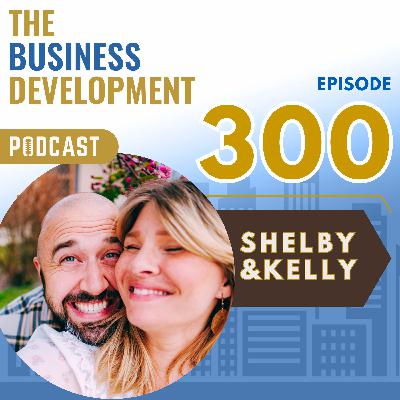
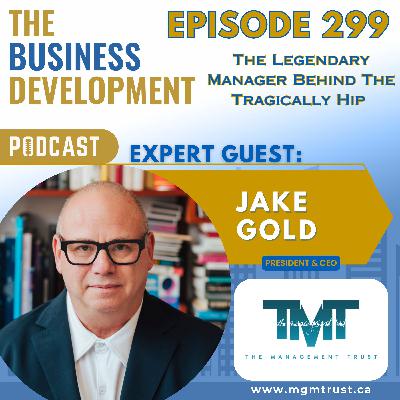
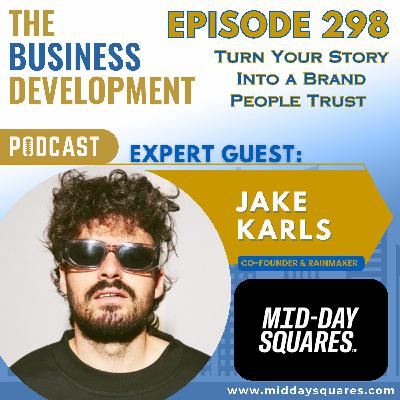

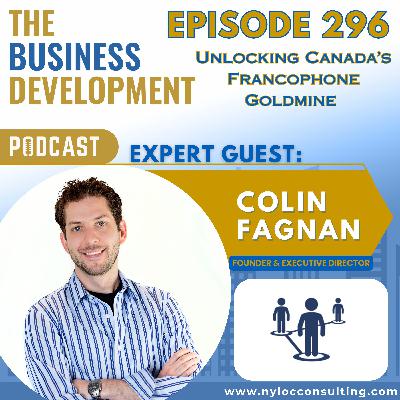
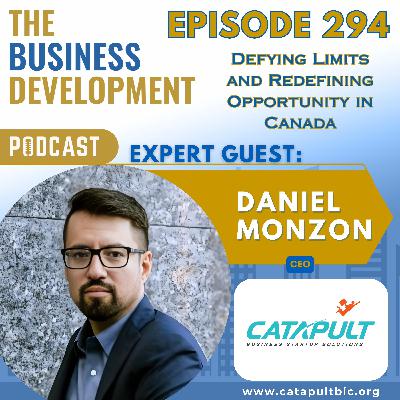

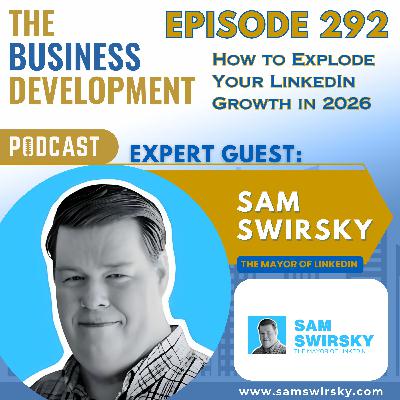
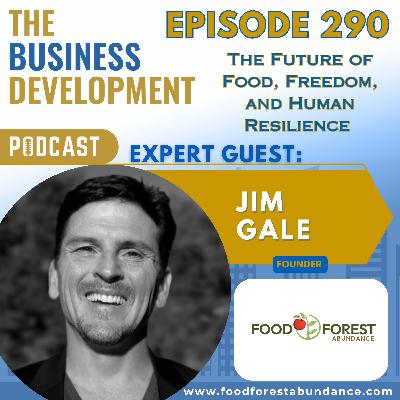
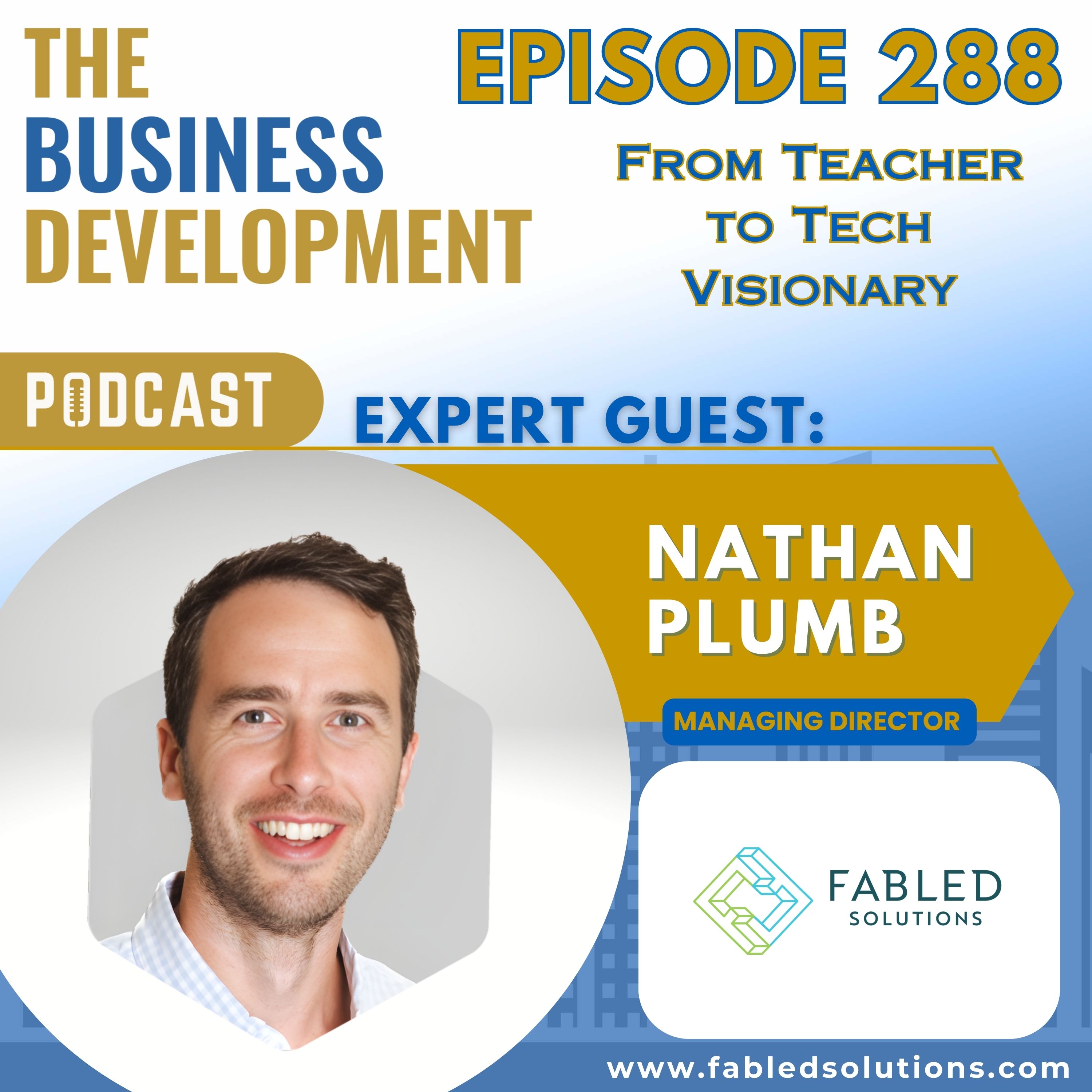
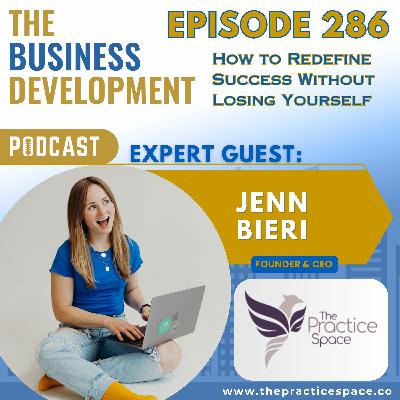
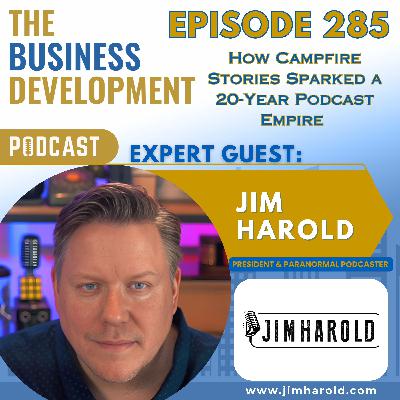
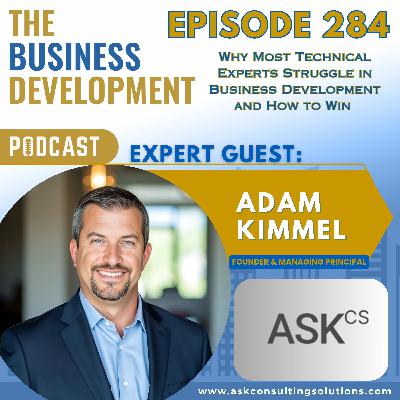




That was a head shot my friend... i just had one today and was surprised when I saw this episode title thank you